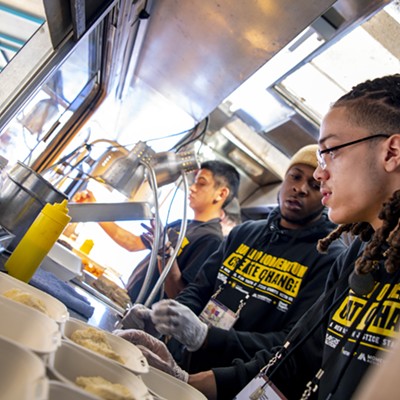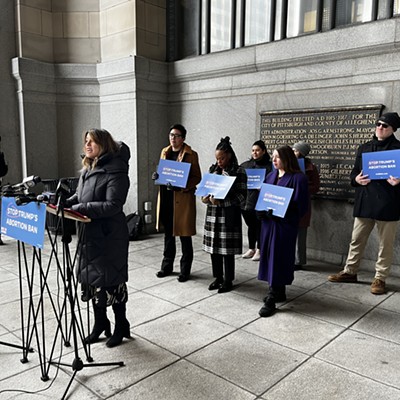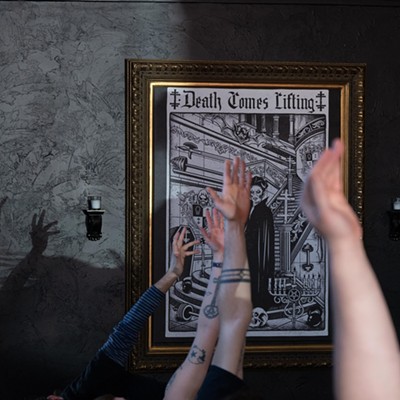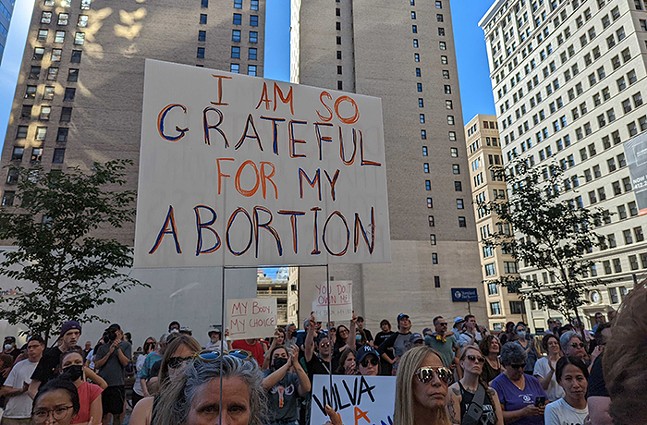
Although anticipated for months, Friday’s announcement that Roe v. Wade will no longer protect the right to abortion has set off shockwaves around the nation and here in Pittsburgh.
Democratic officeholders and abortion advocates say they will work to ensure abortion remains legal in Pennsylvania, while Republicans laud the seismic overturn of legal precedent. The Supreme Court ruling does not itself outlaw abortion, but removes former federal protections on reproductive health care, allowing states to pass their own restrictive laws.
Pittsburghers protest
Locally, Pittsburgh abortion providers are gearing up for new demands, as patients make their way here from neighboring states, including Ohio, where a ban on abortions after six weeks has taken effect, and West Virginia, where a pre-Roe v. Wade law remains on the books and is likely to soon resume enforcement.
Seizing on this, Pittsburgh Mayor Ed Gainey said during a protest on Friday that Pittsburgh would remain a sanctuary for out-of-state abortion patients during his administration.
“Pittsburgh is for you,” Gainey said. “If you want to get an abortion, come to the city of Pittsburgh.”
Gainey’s comments were echoed by a slew of advocates and providers, politicians, and supporters, who each took to the podium during two back-to-back rallies outside the City County Building on the evening of the ruling.
The first, hosted by Women’s March Pittsburgh, attracted throngs of protesters, who spilled across Grant Street and into a parking lot across from the building. The crowd of about 1,000 wielded signs condemning the Supreme Court ruling, with messages including, “I am so grateful for my abortion,” “Rape survivors matter,” “I will not quietly go back to the 1950s,” and “If my uterus was a gun, would you protect it?”
When the first event ended around 7 p.m., many protesters remained for several more hours to participate in a second rally and march, which had been pre-planned in anticipation of the announcement and co-led by several advocacy groups.
Earlier on Friday, City Councilor Bobby Wilson (D-North Side) announced a trio of new bills seeking to protect abortion access locally. One of these, in keeping with Gainey’s remarks, would grant protections to out-of-state patients who undergo abortions in Pittsburgh.
The law, if passed, would prohibit city personnel and law enforcement from “cooperat[ing] with, provid[ing] any information related to, or expend[ing] or us[ing] time, money, facilities, property, equipment, personnel, or other city resources in furtherance of any out-of-state investigation, civil action, or prosecutions related to providing, obtaining, funding, or helping someone else obtain reproductive healthcare that was legal in the Commonwealth of Pennsylvania.”
The law lists exceptions where any of these provisions is overridden by “a Pennsylvania court order, Pennsylvania law, or federal law.”
Wilson’s other proposals seek to regulate “deceptive advertising by crisis pregnancy centers," commonly referred to by abortion advocates as “fake clinics,” in the city, and another would “shield abortion providers in the City of Pittsburgh from out-of-state investigation or prosecution for providing abortion care that is legal in the Commonwealth of Pennsylvania.”
“There was a lot of people who had already paid for their abortions, and when the decision came down, everyone's appointments were canceled."
tweet this
Tidal Wave
Despite these political overtures, some local providers and advocates have pointed out that new demands cannot automatically be met without further financial and political support.
Moira Abrams, member of Pittsburgh-based organization the Abortion Defense Committee, tells Pittsburgh City Paper the Supreme Court decision unleashed havoc in Ohio, where a law passed by the legislature years prior took effect almost immediately.
“There was a lot of people who had already paid for their abortions, and when the decision came down, everyone's appointments were canceled,” she says. “Quite literally, the entire state of Ohio was referred, more or less, to Planned Parenthood of Western Pennsylvania or Allegheny Reproductive Health Center. And so … when most of us in Pittsburgh were processing the news of Roe being overturned, and some of us were getting in the streets, the clinic workers were fielding hundreds and hundreds and hundreds of phone calls from people in Ohio who need to get an abortion, and might not be able to if it weren't for Allegheny Reproductive and Planned Parenthood.”
The Allegheny Reproductive Center is one of just two clinics providing abortion in the western part of the state. The other is Planned Parenthood of Western Pennsylvania. Both are in Pittsburgh.
Abortion clinics receive almost no federal funding in Pennsylvania, with Medicaid funds only kicking in in cases of rape, life endangerment, and incest. Instead, patients pay out-of-pocket or are assisted by fundraising efforts.
La’Tasha D. Mayes, Democratic state house candidate and the founder of abortion advocacy group New Voices for Reproductive Justice, says the increased demand from neighboring states will call for more fundraising efforts to assist those who struggle to pay transportation and accommodation costs.
“The resources and the support are going to come from people on the ground,” Mayes tells City Paper.
Mayes also says the new bans in Ohio will simply add more fuel to an existing problem.
“There’s no doubt that the infrastructure to provide abortion care in Pennsylvania is already over-taxed and exhausted,” Mayes says. “So many abortion providers are already serving women and folks who need abortion care from Ohio and West Virginia.”
Maternal-child health workers say they will also face new demands as a consequence of the court ruling. Several voiced these concerns during a June 28 press conference.
“This influx of patients will entirely overload a system that is already frequently operating at unsafe nurse-to-patient ratios, which means ultimately, all of our patients are only able to receive the bare minimum in their care,” said Mary Lea Mansfield, labor and delivery nurse at West Penn Hospital. “We, as health care workers, struggle every day to provide the care our patients deserve during pregnancy and postpartum.”
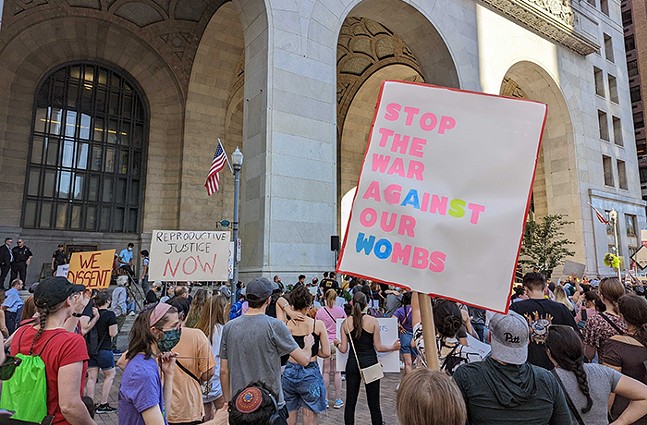
State of the law?
The U.S. Supreme Court’s overturning of reproductive rights at the federal level will turn the spotlight on state legislatures, which now have the power to pass laws restricting abortions.Abortion remains legal in Pennsylvania up to 24 weeks into a pregnancy, and Democratic Gov. Tom Wolf has vowed to veto any anti-abortion bills that may soon pass the Republican-led legislature. But Wolf’s seat expires in November, when he will be replaced by either Democrat Josh Shapiro or Republican Doug Mastriano.
Shapiro issued a statement Friday voicing his opposition to the ruling, and vowed as the state’s current attorney general to protect the practice of reproductive health care from legal challenges.
“While this decision has no immediate impact here in Pennsylvania, it opens the door for our legislature to ban or criminalize abortion by simply passing a law — because there are no longer federal protections," Shapiro says. "I will fight any attempt to erode women's rights in our Commonwealth.”
Meanwhile, Mastriano, a staunch conservative, has frequently indicated support for restricting abortion in Pennsylvania. In a press statement issued at the time of the May 3 court leak, Mastriano referred to the 1973 Roe v. Wade decision as “one of the darkest days in American history.” He went on to refer to abortion as “anti-scientific genocide” and heralded former President Donald Trump’s role in securing a conservative majority in the courts.
Mastriano, a current Pennsylvania senator, introduced a state bill that would require physicians to determine “whether the baby has a heartbeat” before performing an abortion. The bill, introduced in 2021, has six co-sponsors but hasn’t made it out of the health committee.
Separately, a move to amend the Pennsylvania constitution to include language prohibiting support or funding for abortions is also moving through the General Assembly. If it passes, the move must then be approved by voters in a statewide ballot referendum.
Across the state, other Republican officeholders have heralded the ruling as a conservative victory that grants states the right to choose their own laws and policies.
“Today's ruling is a major victory for the pro-life movement, but our work has only begun," says Mike Kelly, a Pennsylvania Republican Congressman from Butler County. "All little boys and little girls deserve a chance at life, and this ruling ensures they will get that chance."
Many pro-choice advocates have criticized the rhetoric of Kelly and others for its narrow focus on the well-being of unborn babies.
During Friday’s rally, Allegheny County Councilor Bethany Hallam (D-North Side) countered that a truly “pro-life” outlook would place a high value on the lives of pregnant people, newborns, and families.
“If this was about babies, we’d have universal health care,” Hallam said. “[I]f this was about babies we’d have formula on the shelves of Giant Eagle.”




